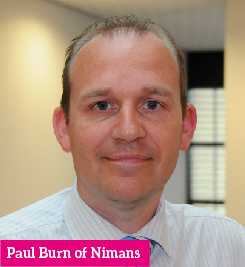
With a few exceptions we tend not to hear much from traditional PBX vendors these days. Leastways they don’t talk telephony to any great extent and we certainly don’t hear about new hardware based systems being launched. In between writing this and publication date however I am going over to Samsung to see their new telephony product but know nothing about what they are going to show me ahead of their reseller launch at the Belfry on 24 February.
 Now it’s no use lamenting the passing of the ‘good old days’ when PBX systems ruled the comms channel. Personally I think the demise of over priced pieces of proprietary hardware with tortuous configuration rules was well overdue.
Now it’s no use lamenting the passing of the ‘good old days’ when PBX systems ruled the comms channel. Personally I think the demise of over priced pieces of proprietary hardware with tortuous configuration rules was well overdue.
Most vendors have moved on of course. Today they have unified communications solutions that are often hybrid-based systems that combine hardware and software. They still however tend to be information islands rather than IP networked solutions designed for the flexibility and agility users need. They can scale up but can’t scale down and every time you want more services they still tend to be expensive. For that you need UCaaS solutions.
There’s also no point in my saying that for PBX resellers the days are getting numbered either. Too many people have claimed to see the death of the PBX coming in the past only for the alternatives to stumble and in some cases fall before gaining critical traction.
The only point I can make is that sales of PBX systems are declining but meanwhile many resellers will continue to sell them and make a living from those sales.
Going Solo
Marketing and Product Director at SpliceCom Robin Hayman tells us that his company’s underlying technology has always targeted the mid-markets but over the past six months he’s witnessed a major increase in demand from smaller businesses – those requiring 16 extensions or less.
“Many of the traditional ‘dial tone’ vendors are now struggling to compete in this space with their existing products, theoretically opening the door even wider for hosted solutions. But while most hosted solutions are positioned as ‘one-size-fits-all’ the reality of actual deployment and real-life user experience is this isn’t always the case.
We’ve also witnessed a significant rise in new account enquiries from the channel and seen an influx of traditional voice resellers from both camps – our accreditation courses have never been so full!
In order to take full advantage of this smaller business opportunity, we’ve recently launched the MAP Solo, which builds on the success of their original mid-market MultiApp Platform (MAP), launched in 2013.
MAP Solo brings the proven benefits of Unified Communications within the reach of even the smallest business, by delivering a single platform solution that reduces the cost of entry of our systems by 35%. Delivery in conjunction with SpliceCom’s Select Managed Service portfolio means our partners can deliver a full end-to-end solution comprising on-net SIP and managed on-net connectivity - including converged voice and data offers with managed internet breakout – all of which can all be wrapped into a SpliceCom Financial Services pay monthly plan. This allows us to offer a range of private, managed and highly featured communications solutions, which can be tailored to exactly meet the needs of smaller businesses, which in turn makes it easier to close the sale.”
Hayman claims that SpliceCom MAP Solo reduces the cost of entry to true Unified Communications for smaller businesses, by delivering the full suite of apps required to deliver a complete voice solution on a single platform.
“We’re in the unique position where we can achieve this because all of our core apps are developed in-house and have been designed to run as a single unified solution. Other vendors who have acquired, re-badged or reference sell Call Recording, Call Management, Wallboards/Dashboard systems or Smartphone support require separate servers or PCs for every app.
This ‘designed-in’ rather than ‘bought-in’ approach to product development and technology implementation substantially reduces capital costs for resellers and end users, further reducing real total cost of ownership (TCO) for SpliceCom’s customers.”
 According to Hayman MAP Solo also provides a myriad of channel benefits.
According to Hayman MAP Solo also provides a myriad of channel benefits.
“Traditional voice resellers can utilise MAP Solo to ease their entry into the world of soft and virtualised computing environments, whilst still being able to sell, install and maintain a familiar ‘system-in-a-box’ that they know and love. Those from a data or IT background already understand native operating systems, virtualisation and apps, and will appreciate the continuity of supply and on-going support for the server platform and Linux operating system that underpin MAP Solo. And being based on SpliceCom’s existing voice apps means that there are zero training requirements for our existing partners.”
Sitting on both sides of the fence is Craig Herrett, Sales Manager at VoIPon Solutions, who says hosted telephony is becoming more prominent.
“Small to medium sized businesses in particular are seeing the benefits of hosted VoIP, not only in cost, but in setup time and ease of management. Hosted systems are both scalable and reliable, with disaster recovery protection built in.
The 3CX Phone System is a popular Windows based software PBX solution, ideal for businesses of all sizes. 3CX enables you to take your office extension with you, wherever you go, increasing productivity and enabling you to work from anywhere.
However we are still seeing demand for appliance based PBXs, especially in larger businesses. Sangoma have recently purchased the popular open source platform FreePBX. Sangoma FreePBX has combined quality manufacturing and commercial company support with a popular, Asterisk based, open source communications platform. FreePBX comes with a whole host of free features as standard, and users also have access to a huge variety of different add-ons.
Digium Switchvox is still popular, and is taking market share from the likes of Cisco. Switchvox can support up to 600 users and 150 concurrent calls, at an affordable price.”
With regards to where the market is going Herrett says there is a definite shift to hosted telephony coming.
“Going cloud based not only saves money and time on setup, but it makes the entire system easy to manage through the cloud. It also enables features to be added when they are needed, giving users complete customisation over their system. Cloud telephony is also highly scalable, resilient and perfect for businesses that have multiple office locations.
We have started offering our own hosted service and we anticipate to see an increase in popularity, as companies begin to see that using cloud telephony really is a no brainer. Our system requires no contract and is highly scalable depending on the business requirements of the user.”
What about UC and collaboration? Well according to Herrett the most important integrated application is mobility.
“Users require softphones on their mobile phones, avoiding the need for call diverting or device registering. Convenience is essential for businesses, so making things as simple and effortless as possible is vital.”
Director of Operations UK and Ireland at Swyx, Mark Russell, says that both last year and so far in 2016, Swyx’s CPE business has been incredibly strong even though they also offer the choice of cloud.
“We are still very much in the cross-over stage and currently on-premise PBXs still represent 80% of total UK sales and at current adoption levels we predict that it will still take 2-3 years for cloud revenues to become comparative. I think there are a few reasons why businesses are favouring an on-site solution. With low interest rates money is cheap at the moment so companies are more conducive to buying outright, plus leased finance solutions can compete well against cloud equivalents.
What is clear though, is for those that do favour capital purchases, very few are asking for old-fashioned hardware based phone systems. This is partly due to the fact that employees are now more savvy and demanding in terms of how they communicate today. They expect an employer to offer the flexibility and additional functionality of virtual meetings, rich presence and the ability to interact over a choice of devices. The other appeal of on-premise that we’ve seen is that companies feel they have more control over integration with other on-site systems such as Active Directory, which may be more problematic if they went for a hosted solution.
Of course there are also those organisations that are opting for the best of both worlds, by buying their own UC solution but hosting it in their own datacentre. We see this as a growing trend that, with the exception of smaller businesses, will finally replace the tradition of having an office-based solution.”
Paul Burn, Head of Category Sales at Nimans says the PBX market remains under pressure but at Nimans they are not feeling as much pain as the MZA stats would indicate where there have been some pretty heavy drops.
“Yes it’s hard out there for PBX resellers and hosted is increasing.
There’s a balance to be struck for resellers and ourselves and we feel we are in a good place to support them. Whatever the speed of transition and balance of their customer base we can work in tandem with them. Clearly there are strong arguments to have both PBX and hosted in their kit bags and the majority of resellers are grasping the nettle now. Some have gone all the way down the road of hosted without any PBX and that’s fine and some have said they are not doing any hosted yet. But most sit somewhere in the middle. That’s the common ground.
Clearly hosted will continue to grow but in the main resellers are relaxed about the whole situation. They are developing their skills bases but are under no massive pressure to jump sides anytime soon. Financially it’s viable to remain in both camps. Obviously recurring revenue is a big question for some resellers to address but here at Nimans through our GS-hosted proposition we have removed that challenge. Resellers can still take upfront revenue if they prefer. From our point of view we will monitor the market place, roll with it and try and guide it wherever possible. It’s a typical evolution model.”
According to Burn everything seems to be falling under the UC umbrella now.
“Whether that’s completely accurate I’m not so sure. But in terms of collaboration this is a strong growth area this year. There’s a particular product from Polycom called the Polycom RealPresence Trio 8800 which in my opinion is a game changer. It brings together the demand to collaborate not just audio, but video and file sharing too. This opens up sales opportunities for resellers across the board.
Phone systems have had collaboration software for a while but dedicated products are driving growth much more.”
Vince Leahy, Director at Manchester based distributor Trust, says he still think hosted has a place in the market and his company will have a cloud offering in their portfolio however he believes that CPE based PBX solutions are still the stronger proposition for SME.
“SMEs, like most businesses, are very concerned over security and the increasing possibility of being hacked. We think they are right to have those concerns but believe that traditional PBX systems are inherently more secure than IP based hosted solutions. This fear is compounded by the SME’s general lack of skill sets when it comes to securing their voice and data networks.
We’ve also looked at the financing of similar sized PBX and hosted telephony deals and have to say that the PBX wins hands down.”
Leahy also questions the state of the market for PBX and in particular analyst MZA figures which show a decline of 27% in recent times.
“Yes the market certainly is declining but in our experience to far less a degree that MZA reports. However, for some time I have maintained that there are simply too many PBX vendors operating in the UK market and as a result some are clearly struggling.
It is also our belief that hosted telephony is contributing towards an overall delay in getting purchasing decision from SME’s with the result that many are just putting off any purchase decision altogether.
What I would say is that when it comes to selling PBX systems emphasis should be placed more on the applications they can deliver.”
Reseller Comment
John Whitty, CEO of Solar Communications says that the demise of the traditional PBX continues to be a hotly debated topic by industry experts.
“While we have seen many businesses move towards an IP-PBX system, the on-premises model continues and, despite developments in technologies such as unified communications and SIP, the TDM-PBX is still standard in some organisations.
For some organisations, the cloud continues to be a model of uncertainty and we continue to see some reluctance to move fully away from an on-site approach. The reassurance of being able to see and support their own hardware is important for many IT managers and few will make a switch directly from on-site to the cloud.
Cloud migration strategies are becoming increasingly important to the businesses we are speaking with and this presents a clear commercial opportunity for resellers to support customers as they evolve their communication technology approach.
At Solar, our conversations with customers are increasingly focused on the adoption of ‘true’ unified communications. A PwC report in 2015 highlighted how more than half of UK SMEs were either stuck in an entirely pre-UC world or were simply deploying a number of UC functionalities that were not in any way integrated. Today, we can see that SMEs are thinking more strategically about their communications approach. Rather than deploying disparate tools and UC applications, SMEs understand the benefits of a truly integrated communications infrastructure to cut costs while improving user satisfaction and business efficiencies.”
Ed Says… The fact of the matter remains that the PBX still dominates the SME and Mid Market when it comes to telephony. Just how long that domination will last is unclear in the face of mid market and enterprise users seeking to undertake a digital transformation (DX) of their business over the next three or four years. Should that DX process make significant inroads in to the SME end of the market, and to be honest such types of innovation have previous form, then the change out of PBX to other deployment models will hasten somewhat.

